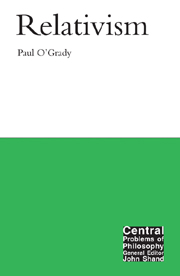6 - Evaluating relativism
Summary
Chapters 2–5 have examined relativism in a number of specific areas of philosophy. In Chapter 2 it was argued that it is incoherent to think of truth as being relative. The argument centred on the claim that the possibility of contradiction was essential to communication and argument. By holding to relative conceptions of truth, one rules out the possibility of contradiction and so endangers communication and argumentation. Because of the significance of contradiction, it furthermore became clear that the limits of logic are established in acknowledging it. One may have alternative systems of logic, but there is a presumption in favour of the dominance of systems holding to the law of non-contradiction. Any calculus that allows contradictions can only be used in a restricted way, and not a universal one. It has to be governed by a higher-level logic that obeys the law of non-contradiction.
Much of what motivates people to accept relativism can be accommodated by ontological relativism, as argued for in Chapter 3. This position attempts to overcome traditional dichotomies such as realism and idealism by rethinking and reconceptualizing the relationship of thought, language and world. The new picture allows for a variety of alternative sets of categories by which the world is mediated to us. None of these is held to be true of the world in itself. The argument goes that that way of thinking about the issues has been superseded.
- Type
- Chapter
- Information
- Relativism , pp. 171 - 182Publisher: Acumen PublishingPrint publication year: 2002

